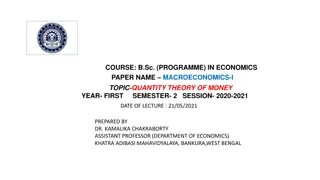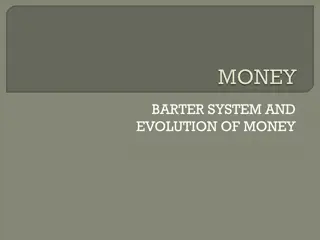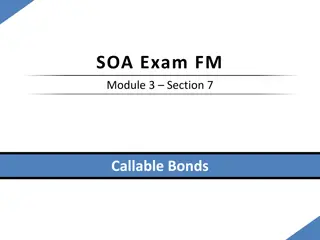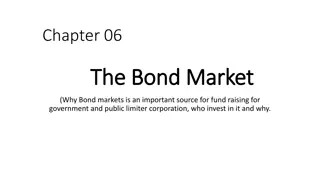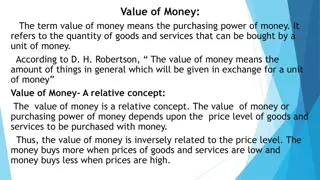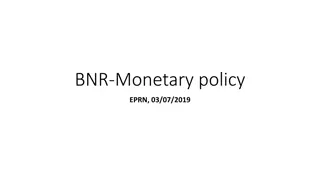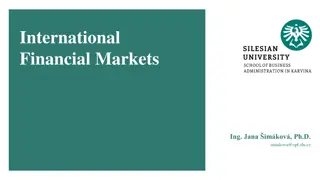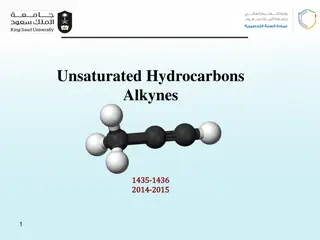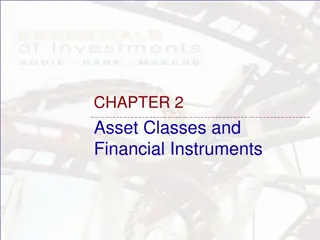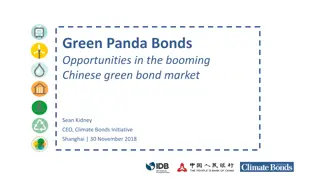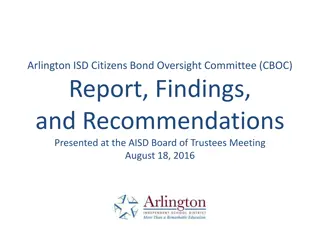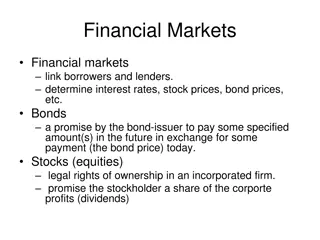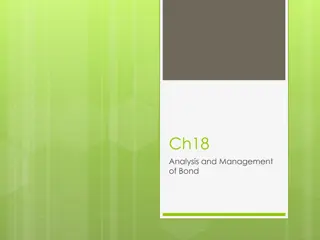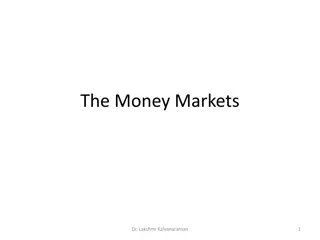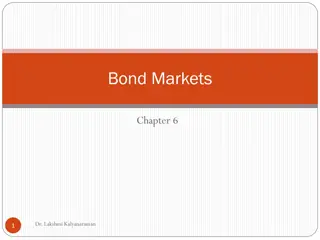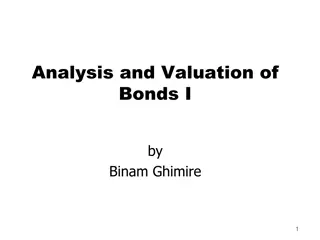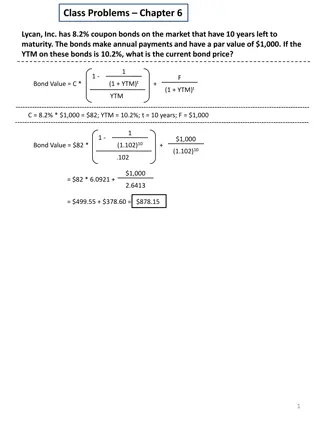Understanding the Importance of Money Markets and Bond Markets
Money markets play a crucial role in the financial system by providing short-term, low-risk, and liquid investment options. Participants include institutional investors and dealers who engage in large transactions. Money market securities have specific characteristics, such as large denominations, low default risk, and short maturities. The money markets offer a cost advantage over banks for short-term funding needs. Bond markets are essential for longer-term borrowing and lending, offering a variety of fixed-income securities to investors.
Download Presentation

Please find below an Image/Link to download the presentation.
The content on the website is provided AS IS for your information and personal use only. It may not be sold, licensed, or shared on other websites without obtaining consent from the author. Download presentation by click this link. If you encounter any issues during the download, it is possible that the publisher has removed the file from their server.
E N D
Presentation Transcript
Chapter 06 The Money Market and Bond Market (Why money markets is important, who participate and what tools and techniques they use)
The Money Market Money market securities are short-term, low-risk, and very liquid. Because of the high degree of safety and liquidity these securities exhibit, they are close to being money, hence their name. The money markets have been active since the early 1800s but have become much more important since 1970, when interest rates rose above historic levels. Rise in short-term rates, coupled with a regulated ceiling on the bank rates resulted in a rapid outflow of funds from financial institutions in the late 1970s and early 1980s. This outflow caused many banks. The industry regained its health only after massive changes were made to bank regulations with regard to money market interest rates
The Money Markets Money currency is not traded in the money markets Money market securities have three basic characteristics in common: They are usually sold in large denominations. They have low default risk. They mature in one year or less from their original issue date. Mostly less than 120 days Money market securities usually have an active secondary market Microsoft s annual report states, We consider all highly liquid interest-earning investments with a maturity of 3 months or less at date of purchase to be cash equivalents.
The Money Markets Money markets are wholesale markets Transactions are very large, usually in excess of $1 million. Instead of individual investors, dealers and brokers bring customers together These traders will buy or sell $50 or $100 million in mere seconds certainly not a job for the faint of heart!
The Need of Money Markets The banking industry exists primarily to provide short-term loans and to accept short-term deposits Banks mediate the asymmetric information problem between saver- lenders and borrower-spenders and earn profits meanwhile However, the banking industry is subject to more regulations and governmental costs than are the money markets The money markets have a distinct cost advantage over banks in providing short-term funds
The Need of Money Markets The limits on interest rates were not particularly relevant until the late 1950s. These limits became especially troublesome to banks in the late 1970s and early 1980s when inflation pushed short-term interest rates above the level that banks could legally pay. Investors pulled their money out of banks and put it into money market security accounts Commercial bank interest rate ceilings were removed in March of 1986, but by then the retail money markets were well established
Purpose of the Money Markets Money market is an ideal place for a firm or financial institution to warehouse surplus funds until they are needed. It also provides a low-cost source of funds to firms, the government, and intermediaries that need a short-term infusion of funds. Most investors use the money market as an interim investment that provides a higher return than holding cash or money in banks Idle cash represents an opportunity cost in terms of lost interest income. The money markets provide a means to invest idle funds and to reduce this opportunity cost.
Purpose of the Money Markets Investment advisers often hold some funds in the money market so that they will be able to act quickly to take advantage of investment opportunities they identify. Most investment funds and financial intermediaries also hold money market securities to meet investment or deposit outflows. The sellers of money market securities find that the money market provides a low cost source of temporary funds
Money Market Instruments Treasury Bills Federal Funds Repurchase Agreements Negotiable Certificates of Deposit Commercial Paper Banker s Acceptances Eurodollars
Treasury Bills Used to finance the national debt Sold with 28, 91, and 182-day maturities Treasury bills can be purchased over the Internet (after Sep 1998) Issued at a discount from par ? ? ? ???????????= ? ? Investment rate % is a more accurate representation of investor earning 360 ?????????= ?(where n=no of days till maturity) 365 ? ?
Federal Funds Short-term funds transferred between financial institutions, usually for a period of one day Fed funds really have nothing to do with the Federal Govt. These funds are held at the Federal Reserve bank Began in the 1920s Banks must keep a certain % of their deposits with Fed Reserve They analyze their reserve position on a daily basis and either borrow or invest in fed funds
Repurchase Agreements (repos) Same as fed funds except that nonbanks can participate A firm can sell Treasury securities to buy them back at a specified future date Maturity is commonly from 3 to 14 days Govt. security dealers may sell securities to a bank with the promise to buy the securities back the next day to manage their liquidity and take advantage of anticipated changes in interest rates
Negotiable Certificates of Deposit A bank-issued security that states a deposit and specifies the interest rate and the maturity date CD is a term security as opposed to a demand deposit Negotiable CD is also called a bearer instrument and can be bought and sold until maturity NCD denominations range from $100,000 to $10 million and a maturity of one to four months Citibank issued the first large certificates of deposit in 1961
Commercial Paper Unsecured promissory notes, issued by corporations, that mature in no more than 270 days (to avoid the need to register issue with SEC) Only the largest and most creditworthy corporations issue them The interest rate the corporation is charged reflects firm s level of risk Most commercial paper actually matures in 20 to 45 days Like T-bills, most commercial paper is issued on a discounted basis Nonbank corporations use commercial paper extensively to finance the loans that they extend to their customers
Bankers Acceptances An order to pay a specified amount of money to the bearer on a given date and have been in use since the 12th century Used to finance goods that have not yet been transferred from the seller to the buyer A bank issues a banker s acceptance to substitute its creditworthiness for that of the purchaser They can be bought and sold until they mature (they are bearer)
Eurodollars Many contracts around the world call for payment in U.S. dollars due to the dollar s stability, thus many companies and governments choose to hold dollars Eurodollar deposits are time deposits Historically, Large London banks offered to hold dollar-denominated deposits in British banks. These deposits were dubbed Eurodollars The market grew rapidly because depositors receive a higher rate of return on a dollar deposit in the Eurodollar market than in the domestic market
Comparing Money Market Securities Interest rates of all of the money market instruments appear to move very closely together over time Reason: all have very low risk and a short term They all have deep markets and so are priced competitively Due to same risk and term characteristics, they are close substitutes If one interest rate should temporarily depart from the others, market supply-and-demand forces would soon cause a correction
How Money Market Securities Are Valued The process of computing a present value: ?? (1+?)? Suppose: You have to submit the bid for Treasury bills this week You decide you need a 2% return Securities have a one-year maturity Treasury bill will pay Rs.1,000 when it matures To compute how much we will pay today we find the present value of Rs. 1,000 ?? =



